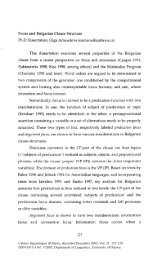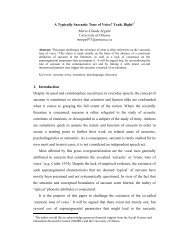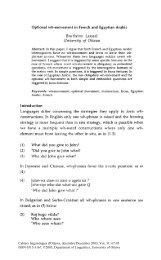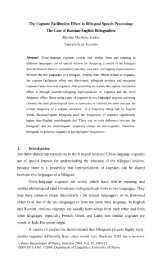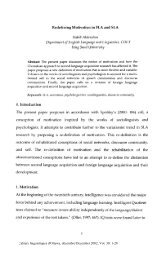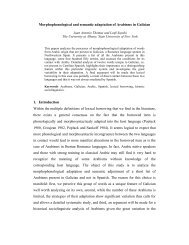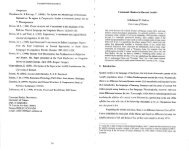Interlingual and Intralingual Interference during Gender Production
Interlingual and Intralingual Interference during Gender Production
Interlingual and Intralingual Interference during Gender Production
You also want an ePaper? Increase the reach of your titles
YUMPU automatically turns print PDFs into web optimized ePapers that Google loves.
Denisa Bordag<br />
into the second language, but rather is generally viewed as a complex cognitive<br />
mechanism underlying SLA.<br />
The emphasis on the cognitive character of interference/transfer, has not,<br />
however, resulted in extensive psycholinguistic research of these phenomena so<br />
far. One of the possible reasons is that for a long time psycholinguistics has been<br />
concerned mainly with the processing <strong>and</strong> acquisition of the first language.<br />
In this paper I want to investigate the influence of interlingual <strong>and</strong><br />
intralingual interference on second language acquisition <strong>and</strong> production. The<br />
subject of my research is grammatical gender. Though a very challenging topic<br />
(as numerous studies exploring grammatical gender production <strong>and</strong><br />
representation in first language show, see below), it has hardly been addressed by<br />
psycholinguists so far. A probable explanation might be the fact that one of the<br />
two languages used in second language psycholinguistic research is usually<br />
English, a language without grammatical gender <strong>and</strong> thus intrinsically unsuitable<br />
for research on the role of interlingual interference in second language gender<br />
acquisition <strong>and</strong> production.<br />
Although there are no studies directly concerned with the topic of this<br />
article, a lot of psycholinguistic research has been done to explore how a second<br />
language is stored <strong>and</strong> processed <strong>and</strong> how it interacts with the first language. In<br />
the first part of this article the relevant findings of this research will be reviewed,<br />
together with findings concerning grammatical gender in the first language. In<br />
the second part, a hypothesis about interlingual interference in second language<br />
gender production will be formulated <strong>and</strong> tested in two experiments. Data from<br />
these experiments will also be used to explore intralingual interference. At the<br />
end of each section, the results of the experiments <strong>and</strong> analyses will be discussed<br />
<strong>and</strong>, where appropriate, compared with results of similar experiments in first<br />
languages.<br />
1.1 Lexical processing by bilinguals<br />
In the human mind, information about words is stored in a mental lexicon.<br />
Lexical units are retrieved on the basis of their meaning. First, a preverbal<br />
message is formulated, which involves the activation <strong>and</strong> retrieval of relevant<br />
2



